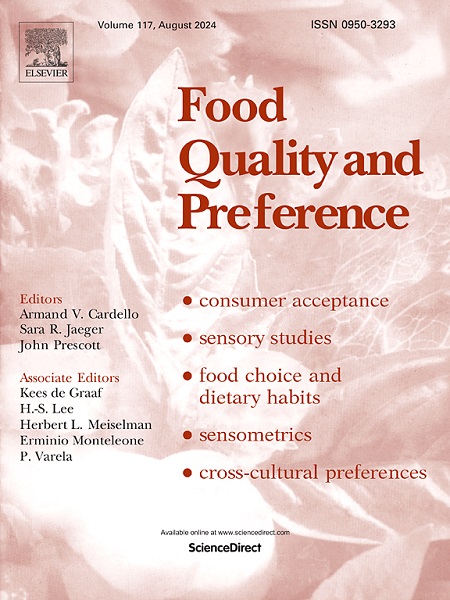了解年轻消费者对植物性产品的态度:结构方程模型分析方法
IF 4.9
1区 农林科学
Q1 FOOD SCIENCE & TECHNOLOGY
引用次数: 0
摘要
人们对转向更多植物性饮食的兴趣日益浓厚,这就增加了了解促使消费者接受植物性替代品的因素的需求。本研究考察了个体特征,如对肉类的依赖、对环境和健康的关注、对动物牺牲的关注和对食品的新喜好,如何影响西班牙年轻消费者对植物性产品的态度。通过在线调查收集了361名年龄在18-35岁之间的消费者对减肉和新食品的态度数据。消费者评估了他们对不同植物蛋白主要来源(大豆、豌豆或小麦)的植物汉堡的预期喜爱程度和购买意愿。结果表明,植物蛋白的来源不影响消费者的反应。肉类依恋、环境和动物牺牲关注对植物性产品的预期喜爱和购买意愿有显著的直接影响(p < 0.05),而健康关注的直接影响不显著(p < 0.05)。在AMOS中使用间接效应估计的中介分析表明,动物牺牲关注在环境关注与预期喜欢和购买意愿之间(部分中介)以及健康关注与相同结果之间(完全中介)之间起中介作用,而在肉类依恋中没有观察到中介作用。因此,关注动物祭祀可能特别有效地推动了植物替代品对环境和健康的好处,但对那些对肉类有依恋态度的人来说却不是这样。我们的研究结果强调,食物偏好和饮食模式在塑造西班牙年轻消费者对植物性产品的接受度方面发挥了关键作用。本文章由计算机程序翻译,如有差异,请以英文原文为准。
Understanding young consumers' attitudes towards plant-based products: A structural equation modelling analysis approach
The growing interest in transitioning to more plant-based diets has increased the need to understand the factors that drive consumers' acceptance of plant-based alternatives. This study examines how individual traits, such as meat attachment, environmental and health concerns, animal sacrifice concerns, and food neophilia, influence young Spanish consumers' attitudes towards plant-based products. Data on consumers' attitudes towards meat reduction and food neophilia were collected from 361 consumers aged 18–35 years using an online survey. Consumers assessed their expected liking and purchase intention of plant-based burgers with different primary sources of plant protein (soy, pea, or wheat). The results showed that the source of plant protein did not affect consumer response. Meat attachment, environmental, and animal sacrifice concerns had significant (p < 0.05) direct effect on the expected liking and purchase intention of plant-based products, whereas the direct effect of health concerns was not significant (p > 0.05). Mediation analysis using indirect effect estimands in AMOS showed that animal sacrifice concerns mediated the relationship between environmental concerns and both expected liking and purchase intention (partial mediation), and between health concerns and the same outcomes (full mediation), whereas no mediation was observed for meat attachment. Hence, focusing on animal sacrifice concerns may be especially effective as a driver to reinforce the environmental and health benefits of plant-based alternatives, but not for those with meat attachment attitudes. Our findings highlight that food neophilia and dietary patterns play key roles in shaping young Spanish consumers' acceptance of plant-based products.
求助全文
通过发布文献求助,成功后即可免费获取论文全文。
去求助
来源期刊

Food Quality and Preference
工程技术-食品科技
CiteScore
10.40
自引率
15.10%
发文量
263
审稿时长
38 days
期刊介绍:
Food Quality and Preference is a journal devoted to sensory, consumer and behavioural research in food and non-food products. It publishes original research, critical reviews, and short communications in sensory and consumer science, and sensometrics. In addition, the journal publishes special invited issues on important timely topics and from relevant conferences. These are aimed at bridging the gap between research and application, bringing together authors and readers in consumer and market research, sensory science, sensometrics and sensory evaluation, nutrition and food choice, as well as food research, product development and sensory quality assurance. Submissions to Food Quality and Preference are limited to papers that include some form of human measurement; papers that are limited to physical/chemical measures or the routine application of sensory, consumer or econometric analysis will not be considered unless they specifically make a novel scientific contribution in line with the journal''s coverage as outlined below.
 求助内容:
求助内容: 应助结果提醒方式:
应助结果提醒方式:


